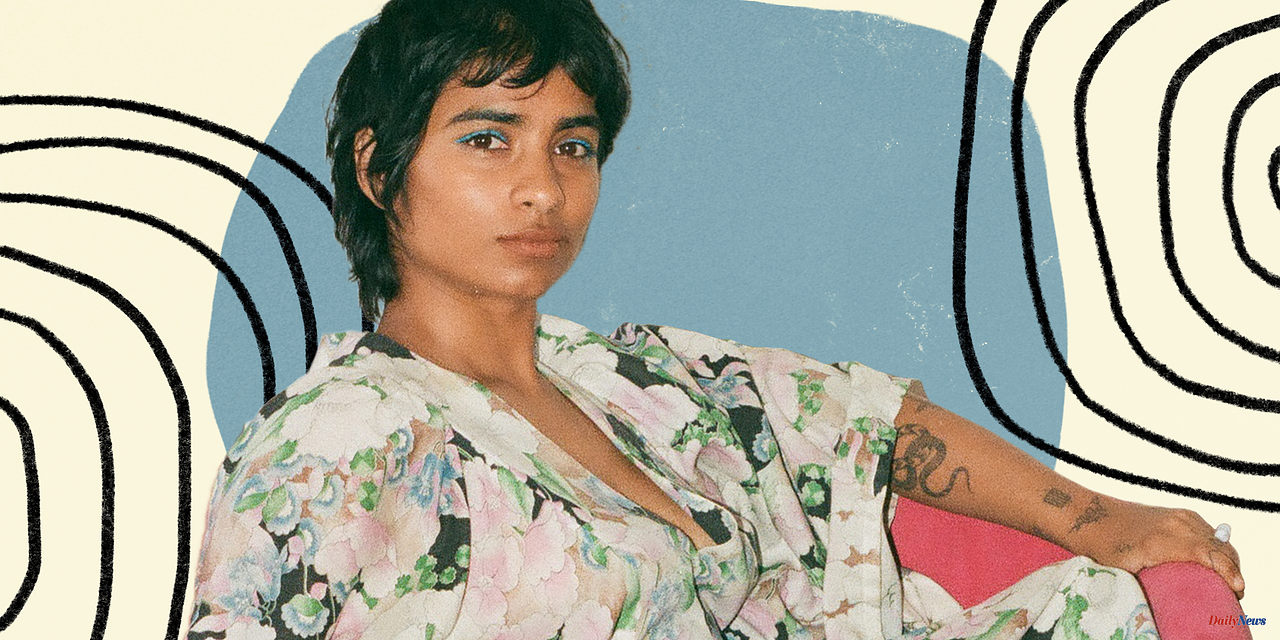Fariha Roisin, a queer Bangladeshi Muslim artist and poet, says that she struggled with assimilation growing up in Sydney. Roisin, who was twenty years old, moved to America to explore her native culture through food and traditions. She also began practicing therapeutic practices such as meditation and yoga. She has written extensively on contemporary Islam, self-care and queer identity, for outlets such as Vice, Al Jazeera and The New York Times. In 2019, she published How to Cure A Ghost, a collection of poetry.
Her most recent book, Who is Wellness for: An Examination of Wellbeing Culture and Who It Leaves Behind examines the ways that modern culture has created billion-dollar wellness industries based on practices like yoga and meditation. This often happens without including the Black, Brown and Indigenous people who developed these ideas. Roisin's memoir is part investigative journalism and part memoir. But she says that Who Is Wellness For will be a sweet invitation to a difficult conversation. Then, you should feel optimistic about the work ahead.
Roisin believes there are many examples of wellness businesses working towards equality, despite her book's criticisms of meditation apps that make billions. She recently began working with Hinge, a dating app. The company launched a mental health initiative in May 2022 specifically for queer peoples of color. It will provide $10,000 to 10 aspiring mental healthcare providers to cover the cost of their education. Roisin was part of the candidate and campaign review process. It's exciting because it's one way that a company with millions of dollars can see the gaps and ask, "How can I give back a portion of the community that's missing? And how can we make sure they have access to more mental health information?"
The 30-year-old artist is based in Los Angeles and talks to SELF about her book, how the industry can give back native cultures, and the importance of self-love and rest.
SELF: You write at the beginning of your book that "becoming the greatest person I could" was a "trauma reaction"--a reaction not feeling enough due to the abuse you suffered as a child. What is your current attitude to self-improvement?
Fariha Roisin says: My healing journey was largely about accepting and acknowledging the fact that I must do many things simultaneously. It feels like a never-ending journey because I am healing one part of me and then another aspect comes out and I am like, "Oh, this is also my responsibility."
As humans, I believe that we have bought into the belief system that everything should be simple, especially in this age of capitalism. Many of us are trying hard to heal, or are trying hard to fix ourselves. But we often lose sight of the whole picture. Real healing requires a holistic experience. For people like me with severe psychological traumas, it might not suffice to only do trauma therapy. Most people won't find it useful. It is possible to add other activities to this work. For me, I have been focusing on getting physical therapy and acupuncture. These things should all be available to everyone.
What can we do for wellness options that are within our reach?
It's important to be honest with yourself, and not allow advertising to dictate what self-care looks like for you. Many of the things that are sold to me as good life options may not be what I actually desire. Perhaps what I really want are a hot water bottle, a book, and a cup of good coffee.
There are many things that we can do with our limited resources to take care of ourselves. This includes finding therapy. Although it's not possible for everyone, the stigma surrounding mental health care can make it more difficult to access than the financial. Today, there are many ways to get cheaper therapy. That's great.
Is journaling what you mean when you say "be truthful with yourself"? Talking to a friend. Relaxing and observing what happens.
It is important to practice self-contemplation. Meditation is a great way to tap into your true desires and needs. I believe we were born into this world with so much ancestral wisdom, even though it isn't readily accessible. Although I don't know much about my grandparents, the more I learn about Indian culture and South Asian cultures, the more I am able to access parts of myself.
A lot of the book was about recognizing the beauty and value of a culture I had lost and finding it through Ayurvedic foods like dal and making my own ghee and practicing yoga. These practices have allowed me to return to my cultural roots. That is something anyone who is from the Global South can access.
If you are an immigrant, it is likely that your family and ancestral lines have their own ways of pre-colonization and post-colonization to care for themselves. You will find a way to get back to yourself the more you search for those archives.
Your book is about how American wellness culture is a luxury product that relies on the wisdom of Indigenous, Brown and Black peoples, but often ignores or excludes them. How can we make wellness more inclusive and respect its roots?
It's all about understanding the context. It's not about doing yoga wrong, but understanding why you do it. Knowing where the practice originated and how it is Indianized is also important. It was born out of people's curiosity about evolution.
If you are a white person and own a yoga studio, you should give some of your income back to the Global South, specifically to Indian farmers who protect the land, water and culture. Around 440 million Indians are below the poverty line. Anyone who makes a profit from South Asian practices, and isn’t from the region, has a huge responsibility. This is a shift that I believe is necessary.
I believe it is essential to bring authentic voices into the wellness community, people who are truly invested in holistic wellness practices.
How can we return to meditation's original culture without selling it?
Meditation should be available for free. If the venture is capitalized, I believe that 100% of the proceeds should go back to Indians. Meditation is not free. It is free in India. It's free to learn from masters willing to share their knowledge.
It should not be profit-oriented. I find it extremely alarming that this industry is a billion-dollar one. It's disgusting to me that capitalism has been conflated and equated with evolution. That's insane. What I'd like to see are these companies giving money to the Global South and showing colonial reparations.
In your book, you mention the Nap Ministry. This organization focuses on the power and healing potential of naps. Its mission statement is "Rest is resistance." What is the importance of rest?
It is essential to rest. Sometimes I feel very, very unrestful. I must move. In that sense, I am very driven. However, I have learned to take down time, rest and process. It's part of it too. Resting is not only about resting but also about resting frequently. We need the basics: love, food, water and rest.
Our capitalist world makes it difficult to prioritize productivity. You have to learn how to say "No, I'm actually going off today" or "I'm going slow today." I think finding work that allows you that flexibility is great, but I believe we can shift the mindset and language around work to make rest more accessible for everyone. It is very American to work to the bone.
How can someone ensure rest?
While we are trying to change the stigma surrounding rest, it is an individual thing. It's like saying "Actually I do need a masseuse." It's important to take a break every day. It is not healthy to be constantly on the move. Each person has different abilities and requires a different pace. Sometimes I need to take a break from my computer. This is for me a way to reset. I'm starting afresh by resting and regenerating--something you see often in other animals and the natural world--so I can have more energy to be present.
It is crucial to have more open conversations with friends, colleagues and peers. Also, it is vital to create a language that prioritizes rest and recharge. To give an example, I might tell a friend "I must cancel plans because I have limited capacity right now." For work, I would say "My bandwidth is low so I must decline the assignment."
You write in your book that self-care gives you the chance to choose yourself again. How can you organize your life so that self-care doesn't seem like a drop in a bucket?
It was necessary to plan it in. I have had to say "No, this is not a day for me." These are the hours that I don't work." It's something I value. To be able to say "No, this is not possible."
For example, I don't work until 11:00 a.m. so my morning is my own. I love to watch movies. I read a lot. I enjoy long walks. I go get matcha. I am very contemplative. I meditate, pray, and draw tarot. I let myself have the first hour for me. The rest of the day is my. I don't get lost in all the work or deadlines. This sounds extremely privileged. However, I had to work for it and make my life what I wanted.
You can also prioritize your well-being by telling yourself each day, "You deserve to be loved." This is a great self-care technique--regardless how you feel about yourself, it's finding ways to love yourself. It's about acknowledging that love and not just purchasing myself beautiful things.
We live in an era where we can reimagine our lives, even though it's difficult and ugly. I want to live the life I want. This has required me to accept myself and my needs, and trust that others will love and support me.
This interview was edited for clarity and length.












